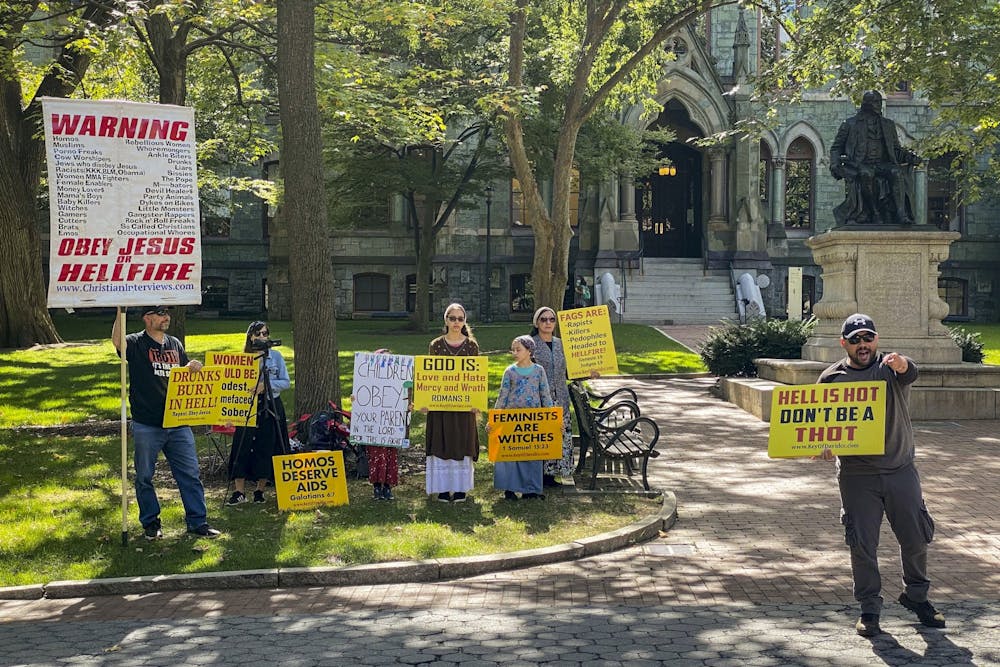Steps away from a Penn event promoting campus safety, a demonstration by a group of Christian protesters yelling homophobic slurs drew a crowd of at least 50 students, who reacted to the messaging with a mix of anger and disbelief.
The group of demonstrators, part of the Key of David Christian Center, a non-denominational Christian Church, held up signs depicting messages such as, “Feminists are witches,” “Drunks burn in hell,” and “Women belong in the kitchen,” and yelled at individual passersby on Locust Walk to “repent.” The group typically visits 30 to 40 college campuses each year, and this is the sixth year it has returned to Penn’s campus, according to Mary Rusfeldt, the wife of Pastor Aden Rusfeldt, who leads the church.
The demonstration took place just hundreds of feet away from the PennReady Wellness, Safety, Security, and Emergency Preparedness Day event on College Green, featuring members of the Division of Public Safety, Medical Emergency Response Team, and Wellness at Penn. The demonstration and the PennReady event were not related.
Many students, particularly first years and sophomores who have not yet witnessed the protest group on campus, challenged the demonstrators by poking fun at what they saw as the absurdity of their messages.
“At first I thought it was satire, like I thought this was a performance group because the content was just so extreme,” Wharton first year Carlee Reid said, standing among a crowd of spectators. “I definitely think that it's interesting that such strong, offensive rhetoric has an immediate place on campus — ironically, next to a safety event."
Even with the understanding that Penn is an “open” campus that is publicly accessible, Reid said Penn should still have relocated the demonstrators to a less central location on campus. Public pedestrians are able to occupy Locust Walk as long as they are not committing a hate crime, Vice President for Public Safety Maureen Rush told The Daily Pennsylvanian in 2017.
“Intuitively, I feel like there should be some preservation of campus morale and the safety of students' emotions," Reid said. "They're legitimately calling the student body very derogatory things. There definitely should be more intervention regardless of the legality of their presence."

RELATED:
Postdoctoral fellow discusses how rise of social media complicates free speech debates
‘Silence is violence’: Students protest against Castle assault, demand action from Penn
Some of the “sins” that the demonstrators denounced included premarital sex, alcoholism, pornography, and homosexuality, Pastor Aden Rusfeldt said. The demonstrators repeatedly used slurs to describe the LGBTQ community and passersby whom they suspected were part of the LGBTQ community.
College sophomore Erica Messics echoed Reid's sentiments, adding that the harmfulness of the group’s message – and the group's aim of inflaming tensions to “get attention” – make the demonstration particularly well-suited for relocation.
“Even if this is a joke or for attention, these are harmful messages that no one deserves to see passing on Locust,” Messics said.
Other students at the demonstration, like College first year Felipe Flores Cruz, emphasized the demonstrators’ right to speak, while still acknowledging their offensive messaging.
“I mean, it's stupid, but as long as they're not actually going to harm anyone, I don't see the problem with them being out here just making fools of themselves,” Cruz said.
Cruz noted that the demonstration did not appear to be effective at converting anyone, likening the demonstrators to attention-seeking “entertainers,” rather than people trying to persuade students to adopt their cause.
Reid attributed the messaging — which she labeled hate speech — to the current political climate, in which instances of hate speech against marginalized communities have become more frequent.
“We're in such a turbulent time as a country; a lot of people are feeling very unsafe, and the polarization has really hit certain communities hard,” Reid said. “Seeing intense discriminatory rhetoric being perpetuated on campus enhances the unrest that the students coming in are feeling right now.”









